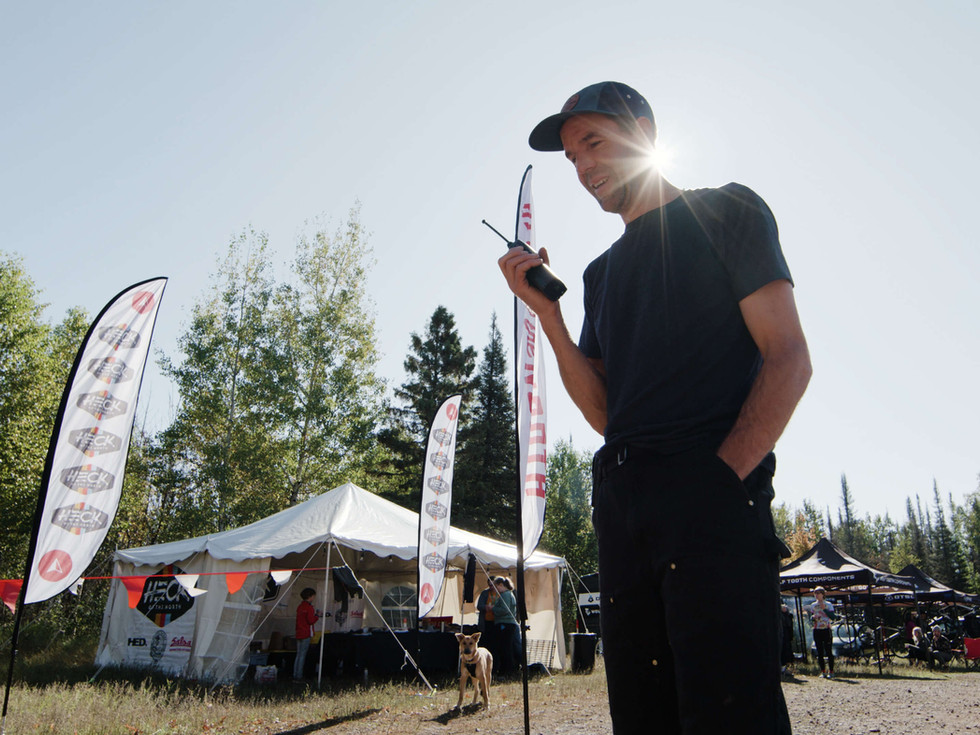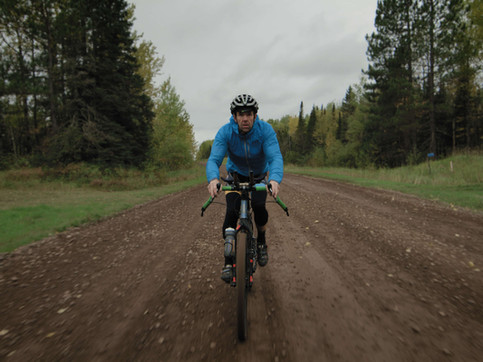JEREMY & DAVID ON "THE GOOD LINE" & FINDING THE SWEET SPOT IN LIFE
- Josh Rizzo
- Oct 2, 2022
- 6 min read
When I first watched The Good Line, it became an instant favorite. The challenge of endurance gravel cycling combined with the beautiful honesty of life struggles makes it inspiring and relatable. In this interview, I talked with David Cowardin, the producer, and Jeremy Kershaw, owner of Heck of the North Productions.
The Good Line is a short film by Blue Forest Films that follows Jeremy Kershaw, owner of Heck of the North Productions, as he processes the balance of endurance cycling, mental health, and the relationships that mean the most. Watch the film and read the full interview with David and Jeremy here.
How did "The Good Line" story come together?
David Cowardin: I loosely followed Jeremy’s gravel cycling events for a few years and two things immediately attracted me: the beauty of the routes, and this concept of riding the good line. I reached out to Jeremy and expressed an interest in shooting a short film about one of his riders and what motivates them to participate in his events.
I was interested in finding someone who wasn’t necessarily participating to win, but rather someone who was participating to fulfill some other need or desire. After a few email exchanges, it quickly became evident that Jeremy was the person I was meant to feature. He was open, honest, and thoughtful … all of the things I look for when considering a story.
Jeremy Kershaw: When David approached me with this idea, I jumped at the chance to work with him. Without a doubt one of the best parts of this experience for me was being part of David’s interview process. His questions were well conceived and that whole period of talking about the events and my life in cycling was powerful for me. It sounds selfish but I mean this in the most open sort of way. I think he did a great job of blending the verbal story into the visual film component.
I loved the swimming scene. How did you come up with that & what role did it play in the film?
David Cowardin: That scene was my favorite as well. When I interviewed Jeremy, he described his Great Divide adventure almost as an awakening, or a rite of passage from one level of self awareness to another. My goal with that scene was to visualize that awakening and take Jeremy off the bike. Watching Jeremy fully submerged in the river for several seconds, I thought, would be an effective way to let the viewer stop and feel what Jeremy was going through mentally. That feeling of being breathless and trapped, but to emerge from that low point feeling clean and whole again.

The swimming scene was also the only scene that I decided to direct. The blend of documentary-style filming with a more directed scene like that was a lot of fun for me creatively. It allowed me to introduce a little of my own creative voice. We joke about that scene now because we filmed it in late September when the air and water temps were quite low. Jeremy felt his body temp drop quite dramatically and we had to blast the heat in the car and Jeremy wolfed down the tin of almonds I had in the console. I now refer to that spot as hypothermia hole.
Jeremy Kershaw: Indeed, it was an intense experience, both physically and also for the story. I knew it was a logistically challenging shot for David and his other assistant for the day. It was without a doubt the coldest I have ever been. I think it took me three hours to fully re-warm! But as David describes, I knew it was a crux move in his story (though I had no idea how exactly he was going to weave it in.) All I knew is that my actor’s union was going to be contacting him for my catatonic condition afterward, lol.
The songs in the film were perfect. How did you pick them?
David Cowardin: Seth Bernard is an artist from Michigan that I was loosely familiar with. He combines music with activism around issues like clean water and racial equity. After casually listening to one of his tunes, I knew it was right for The Good Line. I found the Chris Coleman tune on a music licensing site while searching for something a bit darker and ethereal for the swimming scene.
Jeremy Kershaw: LOL. Turkeys in the rain. Every time I hear that I’m not sure what to think. But the piece at the end just seemed to fit perfectly.

What do you hope people feel after the film?
David Cowardin: I hope people feel inspired to reflect on their own life experiences and perhaps how outdoor recreation has or could influence their lives for the better. I also hope people are left with a strengthened sense of empathy for others.
Jeremy Kershaw: I think a great story has the power of universal connections. David took parts of my life and made it into a really solid story. It is a testament to his creativity more than anything I did in my life. We know, by the feedback that we have received, that it hit a nerve in many who watched. I’m proud of that and I hope people feel less alone, more connected.
David, a lot of your films have deeper themes around personal growth, deep reflection, and outdoor beauty. What do you hope to accomplish with your storytelling?
David Cowardin: That’s a good observation and one that is becoming more clear to me as well. As a storyteller, I’m really interested in showing what makes a person uniquely them, and the way I approach that is by telling a very specific story. Storytelling is also personally fulfilling for me. I love the process and I love learning from the subjects I work with. It’s my own version of the 100-mile gravel ride.
How did the general community around Heck of the North and North Shore cycling receive the film?
David Cowardin: The film was received quite well. A lot of people have mentioned how relatable the story is to them and some have even shared in detail some of their own similar experiences. That’s a great sign to me. It tells me that this film has created a space for people to feel a sense of belonging and community.
Jeremy Kershaw: Right. I am touched by the people who have written to us, sharing their experiences with the film and their own lives. It was a leap of faith for Avesa and I to let this out into the open and we both feel like it took on a life of its own after being released. Again, another sign that David created a story worth viewing.
David, I heard you gave Heck of the North a shot after doing the film. How did that experience go?
David Cowardin: After filming the Heck of the North in 2019, I was very excited to participate in one of Jeremy’s events. My bike experience is mostly limited to commuting and shorter distance mountain biking, so I began trying some longer rides to get a feel for what it’s like. I got hooked and signed up for the 2020 event, which was cancelled due to the pandemic. I was finally able to participate in the 2021 Heck and was not prepared either physically or mentally: I dropped out at the 57-mile checkpoint due to knee pain.
It was still a great experience, though. My favorite moment was when a fellow rider decided to slow down a bit and ride next to me and chat. He asked me about my bike, a beefy Surly ECR, and from there we talked about things strangers, let alone men, typically don’t talk about, but because of the environment Jeremy creates, it felt totally normal. It was, I think, a mini therapy session for the both of us.
What gear did you shoot the film with?
David Cowardin: The Good Line was shot primarily with a Panasonic EVA1 camera. The drone shots were captured with a DJI Mavic 2 Pro. My friend, Jasper Meddock, helped capture drone shots during the 2019 Heck event in addition to driving my vehicle while I filmed from the back.
Is there anything else you’d like people to know about the Good Line?
Jeremy Kershaw: Well, I’ll tell you that this past year has been a challenging one. I know it has been for many. I admit that I come back to this line, this idea on a regular basis in my own life, frequently. Where am I at? How are things flowing? How does this compare to the Good Line I have felt before? It’s dynamic and always needs to be reevaluated. I would never pretend it is the only way to view life…but it sticks for me and I think it helps me get back to that sweeter spot in life.
Maybe that’s what gravel cycling and endurance events have taught me the most. They remind me on a daily basis that I can get through some pretty tough conditions. But when I can’t do it alone, I’ve got good people nearby to help me out. I hope that is the community we foster in our events.

To learn more about Heck of the North or register to ride one of the events, visit their website. David Cowardin owns Blue Forest Film; visit his YouTube channel or check out his website for more information.

















